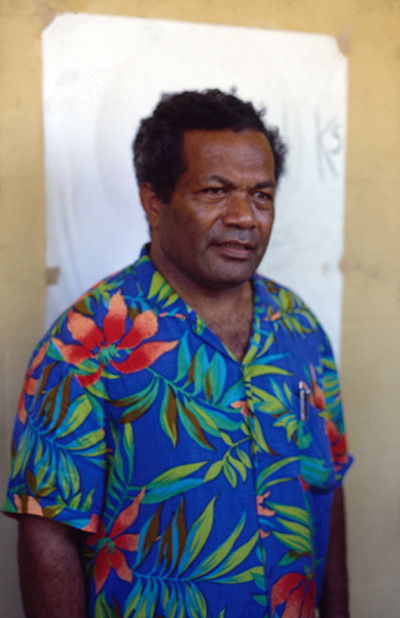
By Patrick Decloitre, RNZ Pacific correspondent French Pacific desk
New Caledonia’s largest pro-independence party, the Union Calédonienne (UC), has unveiled the main outcome of its congress last weekend, including its plans for the French Pacific territory’s political future.
Speaking at a news conference on Thursday in Nouméa, the party’s newly-elected executive bureau, now headed by Emmanuel Tjibaou, debriefed the media about the main resolutions made during its congress.
One of the motions was specifically concerning a timeframe for New Caledonia’s road to independence.
- READ MORE: Mixed reactions to Tjibaou’s election to key Kanak pro-independence party
- Other Kanaky New Caledonia reports
Tjibaou said UC now envisaged that one of the milestones on this road to sovereignty would be the signing of a “Kanaky Agreement”, at the latest on 24 September 2025 — a highly symbolic date as this was the day of France’s annexation of New Caledonia in 1853.
‘Kanaky Agreement’ by 24 September 2025?
This, he said, would mark the beginning of a five-year “transition period” from “2025 to 2030” that would be concluded by New Caledonia becoming fully sovereign under a status yet to be defined.
Several wordings have recently been advanced by stakeholders from around the political spectrum.
Depending on the pro-independence and pro-France sympathies, these have varied from “shared sovereignty”, “independence in partnership”, “independence-association” and, more recently, from the also divided pro-France loyalists camp, an “internal federalism” (Le Rassemblement-LR party) or a “territorial federation” (Les Loyalistes).
Charismatic pro-independence leader Jean-Marie Tjibaou, Emmanuel’s father who was assassinated in 1989, was known for being an advocate of a relativist approach to the term “independence”, to which he usually preferred to adjunct the pragmatic term “inter-dependence”.

Negotiations between all political parties and the French State are expected to begin in the next few weeks.
The talks (between pro-independence, anti-independence parties and the French State) are scheduled in such a way that all parties manage to reach a comprehensive and inclusive political agreement no later than March 2025.
The talks had completely stalled after the pro-indeoendence riots broke out on 13 May 2024.
Over the past three years, following three referendums (2018, 2020, 2021, the latter being strongly challenged by the pro-independence side) on the question of independence (all yielding a majority in favour of New Caledonia remaining part of France), there had been several attempts to hold inclusive talks in order to discuss New Caledonia’s political future.
But UC and other parties (including pro-France and pro-independence) did not manage to sit at the same table.
Speaking to journalists, Emmanuel Tjibaou confirmed that under its new leadership, UC was now willing to return to the negotiating table.
He said “May 13 has stopped our advances in those exchanges” but “now is the time to build the road to full sovereignty”.
Back to the negotiating table
In the footsteps of those expected negotiations, heavy campaigning will follow to prepare for crucial provincial elections to be held no later than November 2025.
The five years of “transition” (2025-2030), would be used to transfer the remaining “regal” powers from France as well as putting in place “a political, financial and international” framework, accompanied by the French State, Tjibaou elaborated.
And after the transitional period, UC’s president said a new phase of talks could start to put in place what he terms “interdependence conventions on some of the ‘regal’ — main — powers” (defence, law and order, foreign affairs, currency).
Tjibaou said this project could resemble a sort of independence in partnership, a “shared sovereignty”, a concept that was strongly suggested early November 2024 by visiting French Senate President Gérard Larcher.
But Tjibaou said there was a difference in the sense that those discussions on sharing would only take place once all the powers have been transferred from France.
“You can only share sovereignty if you have obtained it first”, he told local media.
One of the other resolutions from its congress held last weekend in the small village of Mia (Canala) was to reiterate its call to liberate Christian Téin, appointed president of the FLNKS (Kanak Socialist National Liberation Front) in absentia late August, even though he is currently imprisoned in Mulhouse (north-east of France) pending his trial.
Allegations over May riots
He is alleged to have been involved in the organisation of the demonstrations that degenerated into the May 13 riots, arson, looting and a deadly toll of 13 people, several hundred injured and material damage estimated at some 2.2 billion euros (NZ$3.9 billion).
Tjibaou also said that within a currently divided pro-independence movement, he hoped that a reunification process and “clarification” would be possible with other components of FLNKS, namely the Progressist Union in Melanesia (UPM) and the Kanak Liberation Party (PALIKA).
Since August 2024, both UPM and PALIKA have de facto withdrawn with FLNKS’s political bureau, saying they no longer recognised themselves in the way the movement had radicalised.
In 1988, after half a decade of a quasi civil war, Jean-Marie Tjibaou signed the Matignon-Oudinot agreements with New Caledonia’s pro-France and anti-independence leader Jacques Lafleur.
The third signatory was the French State.
One year later, in 1989, Tjibaou was shot dead by a hard-line pro-independence militant.
His son Emmanuel was aged 13 at the time.
‘Common destiny’
In 1998, a new agreement, the Nouméa Accord, was signed, with a focus on increased autonomy, the notions of “common destiny” and a local “citizenship” and a gradual transfer of powers from France.
After the three referendums held between 2018 and 2021, the Nouméa Accord prescribed that if there had been three referendums rejecting independence, then political stakeholders should “meet to examine the situation thus generated”.
On Thursday, Union Calédonienne also stressed that the Nouméa Accord remained the founding document of all future political discussions.
“We are sticking to the Nouméa Accord because it is this document that brings us to the elements of accession to sovereignty”.
This article is republished under a community partnership agreement with RNZ.







































